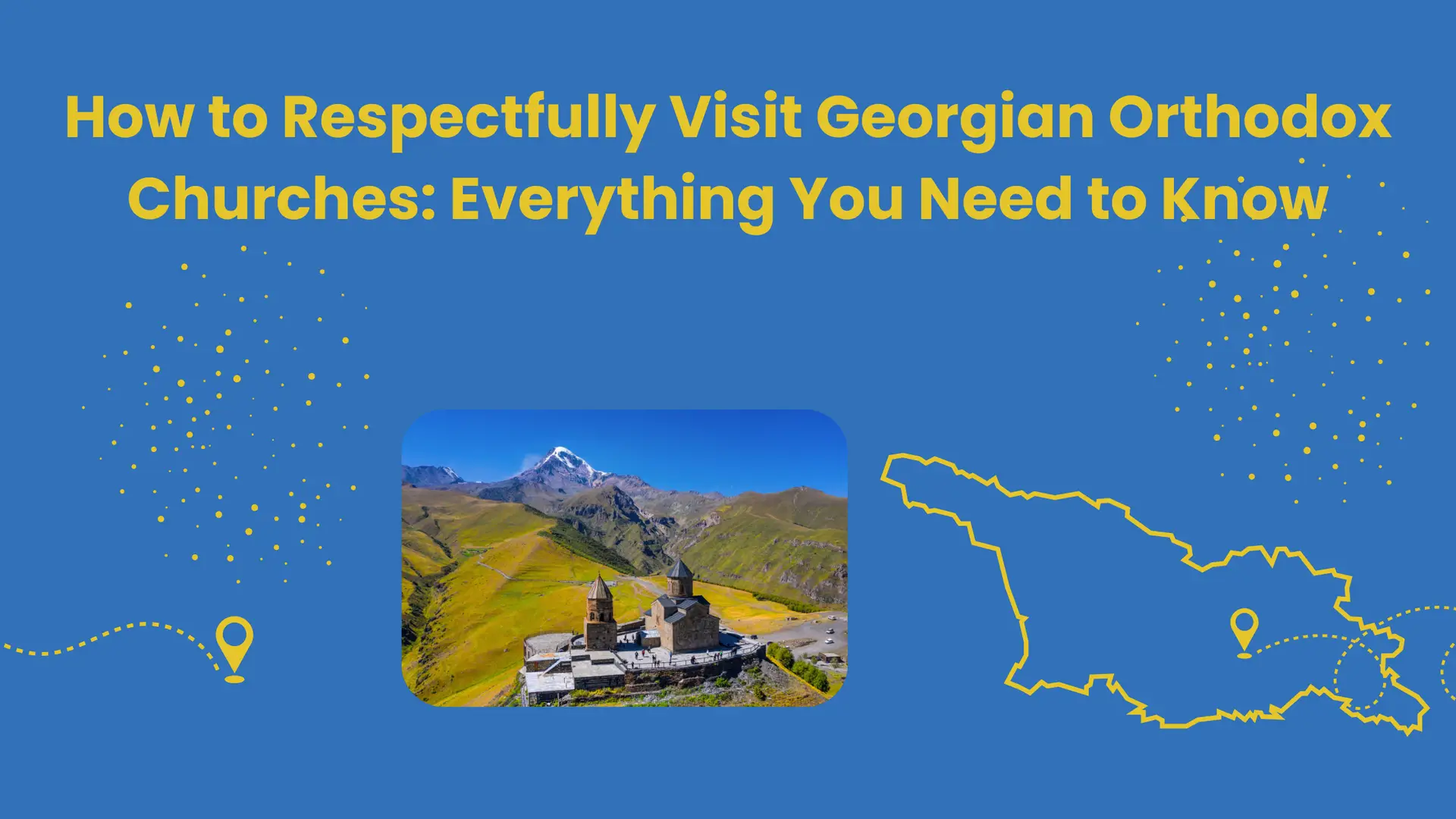Georgia isn’t just a destination—it’s a journey through four distinct seasons, each revealing a different side of this captivating country. As a local Georgian, I’ve experienced firsthand how our small nation transforms dramatically throughout the year, offering unique experiences in each region depending on when you visit. Let me guide you through the best time to experience each part of our beautiful country.
Winter: Mountain Magic (December-February)
Winter in Georgia means one thing: spectacular mountain resorts transformed into snowy wonderlands.
Kazbegi offers a different kind of winter magic beyond skiing. The sight of Gergeti Trinity Church dusted with snow against the backdrop of Mount Kazbek (Mkinvartsveri) is simply breathtaking. At 5,047 meters, Mkinvartsveri stands as Europe’s fifth-highest peak, creating a dramatic backdrop for winter adventures. Rooms Hotel Kazbegi offers what might be Georgia’s most impressive hotel view—floor-to-ceiling windows that perfectly frame this majestic mountain from the comfort of your room or the panoramic restaurant.
Bakuriani stands out for its cozy winter atmosphere and family-friendly vibe. Personally, I love Bakuriani most because it gives me those perfect winter vibes even though I don’t ski myself. The town exudes charm with beautiful wooden houses, and there’s something magical about gathering with friends at local restaurants after a day in the snow. For non-skiers like me, the overall atmosphere is what makes Bakuriani special.
Gudauri appeals to serious skiers with its exceptional pistes. My skiing friends consistently choose Gudauri for its powder quality and variety of runs. Situated at 2,200m above sea level, it boasts reliable snow conditions with breathtaking panoramic views that even a non-skier like me can appreciate.
Healing Mountain Air: Don’t miss Tsemi and Abastumani during winter months. These mountain spa towns are renowned for their exceptionally clean, crisp air quality and historic sanatoriums dating back to Russian imperial times. For those with respiratory issues or simply seeking rejuvenation, the pristine mountain air here works wonders—I’ve personally felt the difference after just a weekend stay.
Georgian New Year’s Celebration: Unlike many Western countries, in Georgia we celebrate New Year’s Eve more enthusiastically than Christmas. December 31st into January 1st is our major celebration, with festivities often lasting until 9 AM the next morning! For an authentic Georgian New Year experience, consider venues like Wine Factory in Tbilisi, Adam & Eve, or Axis Towers, which host some of the capital’s most sought-after celebrations. Meanwhile, Orthodox Christmas falls on January 7th and tends to be a more family-oriented, quieter affair.
Winter by the Sea: If you’re fortunate enough to visit Batumi when snow falls, you’ll witness one of Georgia’s most captivating natural displays—snow-covered beaches creating a stunning gradient against the deep blue of the Black Sea. This rare but magical phenomenon typically happens only a few days each winter, but it’s worth planning around if possible.
Top winter stays:
- Rooms Kazbegi—my personal favorite with minimalist luxury and those incredible floor-to-ceiling windows framing Mkinvartsveri
- Ambassadori Goderdzi—one of Georgia’s best hotels offering refined comfort in a spectacular Adjarian mountain setting
- Marco Polo in Gudauri—perfectly positioned for direct slope access
Local tip: Hotel prices in ski resorts spike dramatically during the winter season. I’ve saved significantly by booking cottages instead—they’re often more spacious and give you that authentic mountain home experience.
Spring: Nature’s Revival (March-May)
As the snow begins to melt, Georgia unfolds in vibrant color. Spring offers pleasant temperatures before summer’s intensity—perfect for exploring both mountains and cities.
The mountainous regions become particularly enchanting in spring. Valleys burst with wildflowers, waterfalls grow mighty with snowmelt, and hiking trails reopen after winter closure.
Tbilisi truly shines in late spring. The capital comes alive with outdoor cafés, blooming gardens in Vake Park, and comfortable temperatures perfect for exploring the cobblestone streets of the Old Town without summer’s oppressive heat.
Worth experiencing:
- Mtshketa surrounded by blossoming fruit trees with the ancient Jvari Monastery standing sentinel above
- Borjomi with its healing spring waters and lush national park as trails reopen
- Lagodekhi Nature Reserve when migrating birds return and waterfalls reach their impressive peak
Summer: Coastal Retreats & Mountain Escapes (June-August)
Summer brings scorching temperatures to Tbilisi (often reaching 38-40°C/100-104°F), making it the perfect time to explore Georgia’s magnificent Black Sea coast or retreat to higher elevations.
Avoid Tbilisi in July-August: As a local, I actively plan to be away from the capital during peak summer. The heat becomes unbearable by midday, with the city’s concrete and stone amplifying temperatures. If you must visit in summer, plan outdoor activities for early morning and evening only.
Western Georgia becomes the country’s playground with resorts like Shekvetili, Kvariati, Gonio, and Chakvi offering beachside relaxation. Though humid, sea breezes provide welcome relief from the heat.
Batumi transforms into Georgia’s festival capital during summer months. If you love music like I do, Batumi is the place to be. I’ve attended the Black Sea Jazz Festival three years running, and the electronic music gatherings attract international DJs that create an incredible atmosphere along the promenade.
Stargazing in Abastumani: Summer offers a unique opportunity to visit the historic Abastumani Observatory. Perched high in the mountains, the clear summer nights provide spectacular stargazing conditions. I still remember my first visit—seeing Saturn’s rings through their telescope was a moment I’ll never forget. The observatory staff offer fascinating tours that make astronomy accessible even to beginners.
Beat the heat:
- Kakheti’s wine country offers elegant resorts with pools amidst vineyards—I recommend Ambassadori Kachreti or Radisson Tsinandali where you can sip wine by the pool with mountain views
- Svaneti’s towering peaks and medieval tower houses offer cool mountain air and spectacular hiking
- Tusheti becomes accessible as mountain passes clear, revealing one of Europe’s most remote highland regions
Autumn: Wine Country Glory (September-November)
Autumn in Georgia is pure magic, especially in the eastern wine region of Kakheti where vineyards turn golden and the grape harvest (Rtveli) begins.
This is the season of abundance—both in produce and cultural experiences. The moderate temperatures make it ideal for exploring Georgia’s countryside and participating in traditional wine-making activities.
Worth experiencing:
- Join a traditional rtveli (grape harvest) where families gather to pick grapes and press them the ancient way—by foot in large stone troughs
- Visit family cellars like Tchotiashvili where wines are made in qvevri (clay vessels buried underground) following 8,000-year-old traditions
- Explore the fortified town of Sighnaghi with its cobblestone streets overlooking the Alazani Valley dressed in autumn colors
Local tip: Autumn is when I personally schedule most of my wine tours as a local. Winemakers have more time for in-depth conversations and cellar tours than during busy summer months, and the freshly fermenting wine gives you a glimpse into the entire production process.
Frequently Asked Questions
Q: When is the absolute best time to visit Georgia overall?
A: Based on my experience living here my entire life, May-June and September-October offer the most pleasant weather nationwide and allow you to experience multiple regions comfortably. These shoulder seasons also mean fewer tourists and better prices.
Q: If I don’t ski, is winter worth visiting Georgia?
A: Absolutely! I don’t ski either but still love our winter resorts. Bakuriani has a charming atmosphere with excellent restaurants, beautiful winter walks, and options like sledding or snowmobiling. The thermal pools in Tbilisi’s sulfur baths are particularly enjoyable when it’s cold outside, and the healing air of Tsemi and Abastumani offers unique wellness benefits.
Q: How do Georgians celebrate the winter holidays?
A: Unlike many Western countries, our biggest celebration is New Year’s Eve rather than Christmas. December 31st sees major festivities in cities across Georgia, with parties lasting from late evening until sunrise the next day. Christmas falls on January 7th following the Orthodox calendar and is typically more family-oriented. For visitors, New Year’s in Georgia offers a unique cultural experience with spectacular fireworks and feasting.
Q: Are summer temperatures manageable in Tbilisi?
A: As someone who lives in Tbilisi, I can tell you that July-August can be brutally hot. Temperatures regularly exceed 35°C/95°F and can hit 40°C/104°F. Locals either escape to the mountains or coast or adapt their schedules completely—starting the day very early, resting during the hottest hours (2-5 pm), and enjoying evening activities when temperatures drop.
Q: Which season offers the best value for money?
A: Spring (except Easter) and autumn (after mid-October) offer excellent value. Winter has high prices in ski resorts but lower rates elsewhere. July-August see peak prices nationwide, especially in coastal areas.
Q: How accessible are mountain regions throughout the year?
A: Accessibility varies dramatically. Regions like Kazbegi and Svaneti’s lower parts are accessible year-round (though winter requires snow chains or 4WD). Remote areas like Tusheti are typically accessible only from June to early October when mountain passes are clear.
Conclusion
Whether you’re drawn to snow-capped peaks, sun-soaked beaches, vibrant cities, or rolling vineyards, Georgia’s diverse landscapes offer something spectacular in every season. The key is matching your interests with the perfect region at the ideal time—creating memories that will last long after your journey ends.
I’ve personally experienced each of these regions throughout the seasons, and I’m confident these recommendations will help you discover the Georgia that locals love—not just the Georgia in guidebooks. When you visit, you’ll understand why we believe our small country holds four distinct worlds within its borders, each worth exploring at the perfect moment.





